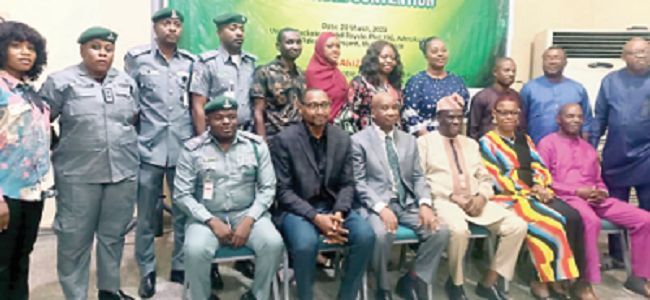
Around 1988, a shipment from Italy berthed at Koko, a small fishing village in old Bendel State or present-day Delta State. Said to be fertiliser to help local farmers, the illegal shipment turned out to be over 2,000 barrels of toxic waste. By the time it was discovered, disease and death had come to Koko residents when the containers started leaking. International furore arose when media attention came to the incident. The government in Nigeria at the time responded quickly. Italy was made to take back the toxic materials.
Since then, Nigeria has made effort to prevent a repeat of that toxic waste episode. Nigeria became a signatory to the Basel Convention on the Control of Transboundary Movements of Hazardous Wastes and their Disposal. Nigeria ratified the Convention on March 31, 1991. One of the obligations of Parties to the Basel Convention is to conduct National Reporting to the convention secretariat for transboundary movements of hazardous and other wastes into and out of member states. This reporting activity keeps in check the movement of hazardous waste.

To strengthen this reporting activity which has implications on public health, the Basel Convention Coordinating Centre for the African Region (BCCC-Africa) organised a one-day workshop on National Reporting Obligations under the Basel Convention in Abuja on March 28, 2023. Stakeholders including the Federal Ministry of Environment, Nigeria Customs Service, National Environmental Standards and Regulations Enforcement Agency (NESREA), environmental consultants and NGOs attended.
Why national reporting?
Explaining the reason for the workshop, the Executive Director of BCCC-Africa, Professor Percy Onianwa, stated that the workshop is a component of the project titled: “Promoting the use of the Basel Convention technical guidelines on transboundary movements of WEEE (waste electrical electronic equipment) and UEEE (used electrical electronic equipment), and enhancing associated national reporting obligations in Nigeria”, organised by BCCC-Africa.
The workshop is the third in a series of events held under the project. Previously, an inception workshop was held in Lagos on December 14 to 15, 2022. A second three-day event from January 18 to 20, 2023, focused on the testing of guidelines for the distinction between waste and non-waste electrical electronic equipment.
The focus of last week’s workshop was on awareness raising and training on the obligations of Parties to the Basel Convention to conduct National Reporting to the BRS Secretariat for transboundary movements of hazardous and other wastes into and out of member states.
According to Professor Onianwa, “National reporting effectively supports the control mechanisms of the convention and enables parties to the convention to easily obtain valuable information to support international trade and the prevention of imports and dumping of hazardous substances.”
In her presentation during the workshop, Melissa Lim, Programme Officer of the Secretariat of the Basel, Rotterdam and Stockholm Conventions, United Nations Environment Programme, stated that countries generally under-report the movement of hazardous waste, adding that the global reporting rate is 60 per cent.
Reporting for national planning, environmental health
Dr Oludayo Dada, a former director of pollution control and envrironmental health at the Federal Ministry of Environment, who chaired the workshop stated that: “The workshop apart from raising awareness on the importance of national reporting and how to do it properly, is to make them see the national and global impact of national reporting.
“We have been advised to maintream issues of chemicals and waste into national planning. This is a good platform whereby we can achieve this. Information gathered from all these stakeholders will be used to effectively plan for the management of chemicals and waste in the country.”
Mrs Miranda Amachree, managing partner of Soribta Nigeria, an environmental consultancy firm, said that the workshop had equipped actors in reporting to the Basel Convention. “The federal ministry of environment cannot do it alone. There are other stakeholders involved. So if they come together to be trained on how to complete the reporting form, there will be less mistakes and a lot of time will be saved.
She added that “In the long run, this builds up to protection of our environment and our health. This is because if hazardous waste are properly managed with all the partners that are here, we will have less waste that will pollute our environment. This will affect the well being of the general populace.”
Dr Leslie Adogame, Executive Director of STRADEV Nigeria, the focal point for chemicals management issues for Nigeria at the NGO level, said there was a need to catalyse the implementation of the Basel Convention “on the ground.”
He said, “We are here to bridge the gap between knowledge and implementation. This is the first time I have seen a workshop of this nature where the reporting framework for the Basel Convention is being made open to stakeholders to review. What we saw in the past were reports sent to the international community without consultations with stakeholders. But here, we are able to review what the Federal Ministry of Environment which is the focal point of the convention is submitting to the Secretariat. This is a major breakthrough for us. This is good not for just an individual, but good for Nigeria.
“It will help us have a more robust reporting, identify gaps in the reporting process and we will be able to have ownership of whatever is reported to the Basel Convention Secretariat in Geneva.”
Dr Livinus Nwankwo and Musa Nurudeen, both of the Federal Ministry of Environment, made presentations on the Basel Convention National Reporting, and Nigeria’s Permitting Process for Transboundary Movement of Wastes. In their presentation, it was noted that Nigeria, having ratified the Convention in March 1991, the Federal Ministry of Environment is the competent National Authority for the Convention.
Article 6 of the convention states that, “the state of export shall notify, or shall require the generator or exporter to notify, in writing, through the channel of the competent authority of the State of export, the competent authority of the States concerned of any proposed transboundary movement of hazardous or other wastes.”
They stated that in order to implement Article 6 of the Basel Convention effectively, the ministry instituted a permit scheme for export of recyclable and disposable wastes from Nigeria to other Parties. These are wastes that Nigeria does not have facilities to handle in an environmentally sound manner.
Background of the project
Between 2015 and 2017, a study conducted by BCCC-Africa assessed that about 60,000 tonnes of used electrical electronic equipment mixed with waste electrical electronic equipment were annually shipped into Lagos.
At least 15,000 tonnes of these were outright waste. It was noted that many relevant enforcement officials and stakeholders including Customs, NESREA, importers, shipping agents, and Basel focal points, lacked the awareness and capacities for effective identification, distinction, and control of the illegal shipments. This shortcoming also impacted the ability to meet national reporting obligations on illegal transboundary movement of e-waste. Despite the sporadic success of Nigeria’s regulatory agency in stopping some shipment of e-waste, this trade continues to grow, the study observed.
What Basel Convention stands for
The overall goal of the Basel Convention is to establish strict controls over transboundary movements of hazardous wastes and other wastes.
The Basel Convention on the Control of Transboundary Movements of Hazardous Wastes and Their Disposal, usually known as the Basel Convention, is the most comprehensive global treaty for the control and management of hazardous wastes.
It was adopted March 22, 1989 and came into force May 5, 1992. As at December 14, 2022 it had 190 parties.
The Basel Convention aims to protect human health and the environment from the negative impacts of hazardous wastes and other wastes.
However, the Basel Convention has three key pillars. They are: control of transboundary movement of hazardous wastes; environmentally sound management of hazardous & other wastes; and minimisation of sources of generation of hazardous wastes.








